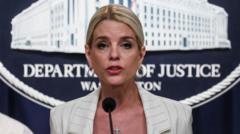In a striking move, President Trump recently issued orders aimed at dismantling long-standing energy and environmental regulations, a decision which many legal experts believe could face significant obstacles in court.
Trump's Bold Regulatory Rollback: A Controversial Executive Order

Trump's Bold Regulatory Rollback: A Controversial Executive Order
President's new approach to regulations faces legal challenges and public scrutiny.
On April 11, 2025, President Trump signed an executive order directing ten federal agencies, including the Environmental Protection Agency and the Energy Department, to adopt an unprecedented strategy for repealing various regulations. The directive mandates that specific energy and environmental rules include "sunset" provisions that would automatically terminate by October 2026 unless agencies opt to extend them for a maximum of five years at a time.
This expansive measure is one of three executive orders Trump signed that day, underscoring his commitment to rolling back federal oversight. In a separate order, he sought to rescind regulations restricting water flow in shower heads, using a controversial rationale: “Because I say so.” Legal scholars have criticized this justification, stating it contradicts the Administrative Procedure Act of 1946, which requires agencies to engage in a public notice and comment period before making such significant changes. According to Jody Freeman, director of the Harvard Law School Environmental and Energy Law Program, the legality of Trump's actions is questionable, suggesting that they either disregard established legal frameworks or are adventurous enough to provoke judicial scrutiny.
These executive orders exemplify the ongoing tension between the current administration's regulatory agenda and the established legal processes meant to ensure public involvement and accountability in governmental decision-making. Experts warn that while the administration's objectives may resonate with certain political bases, the path to reducing regulations may be fraught with legal challenges that could alter their effectiveness.
This expansive measure is one of three executive orders Trump signed that day, underscoring his commitment to rolling back federal oversight. In a separate order, he sought to rescind regulations restricting water flow in shower heads, using a controversial rationale: “Because I say so.” Legal scholars have criticized this justification, stating it contradicts the Administrative Procedure Act of 1946, which requires agencies to engage in a public notice and comment period before making such significant changes. According to Jody Freeman, director of the Harvard Law School Environmental and Energy Law Program, the legality of Trump's actions is questionable, suggesting that they either disregard established legal frameworks or are adventurous enough to provoke judicial scrutiny.
These executive orders exemplify the ongoing tension between the current administration's regulatory agenda and the established legal processes meant to ensure public involvement and accountability in governmental decision-making. Experts warn that while the administration's objectives may resonate with certain political bases, the path to reducing regulations may be fraught with legal challenges that could alter their effectiveness.






















